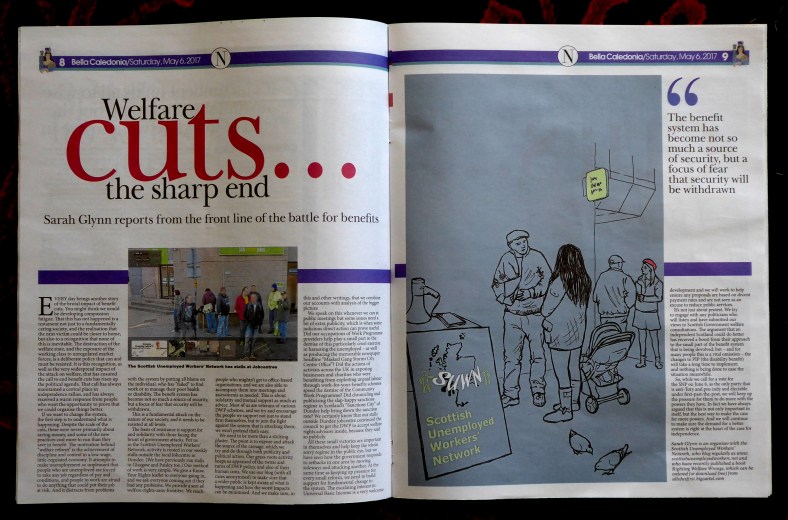
In a world of precarious employment, many people who are getting by on minimum-wage agency work supplemented by Working Tax Credits can be thrown into a major crisis at the whim of their employer. When we met Phil outside the buroo he had been given only a few hours’ work in the last three weeks and was struggling to make ends meet. Another week with reduced hours and he faced losing his Tax Credits as well. Clearly this wasn’t sustainable. He had spoken to the DWP and been told that if he left the agency work and applied for Jobseekers Allowance he would be sanctioned for giving up his job! So his only option was to go on Universal Credit. The one advantage of Universal Credit is that you ‘only’ lose 63p of benefit for every pound you earn, instead of losing all bar £5 when you are on JSA. Otherwise rules are generally more intrusive and the sanctions system is much more punitive, so Phil had good reason not to want to sign up to the benefit.
This didn’t seem right to us. Phil had been working for some time and paying National Insurance, so he should have been eligible for 6 months contribution based JSA; and if you’re on JSA you can’t be forced to accept a just a few hours’ work a week. We gave Phil the details of the local Welfare Rights advice sessions so he could get this sorted out, but this seemed like a problem that is going to keep reappearing, so we thought we would get advice from CPAG for future reference. This is what we learnt:
If you have paid enough National Insurance to qualify for Contribution-based JSA, or if you are in one of the groups who is not currently eligible to apply for Universal Credit, then you can sign up for JSA. You could do this and keep on with the part time work so long as it wasn’t for more than 16 hours a week, but until you started earning more than the amount of the JSA you would effectively be working for nothing. The DWP Guidance (paras 534415-18) says clearly that you shouldn’t be sanctioned for giving up a zero-hour contract, but that doesn’t mean that they won’t try. You should win an appeal, but might risk some difficult money-less weeks first.
If you are entitled to contribution based JSA then you shouldn’t actually get Universal Credit; but this wouldn’t be the first time that someone has been erroneously signed up to the new benefit. The DWP love getting people onto Universal Credit, and once there it is very difficult to leave. Next time you get a job then you stay on Universal Credit rather than Working Tax Credits.
All in all then, pretty much a Catch 22 arrangement.










